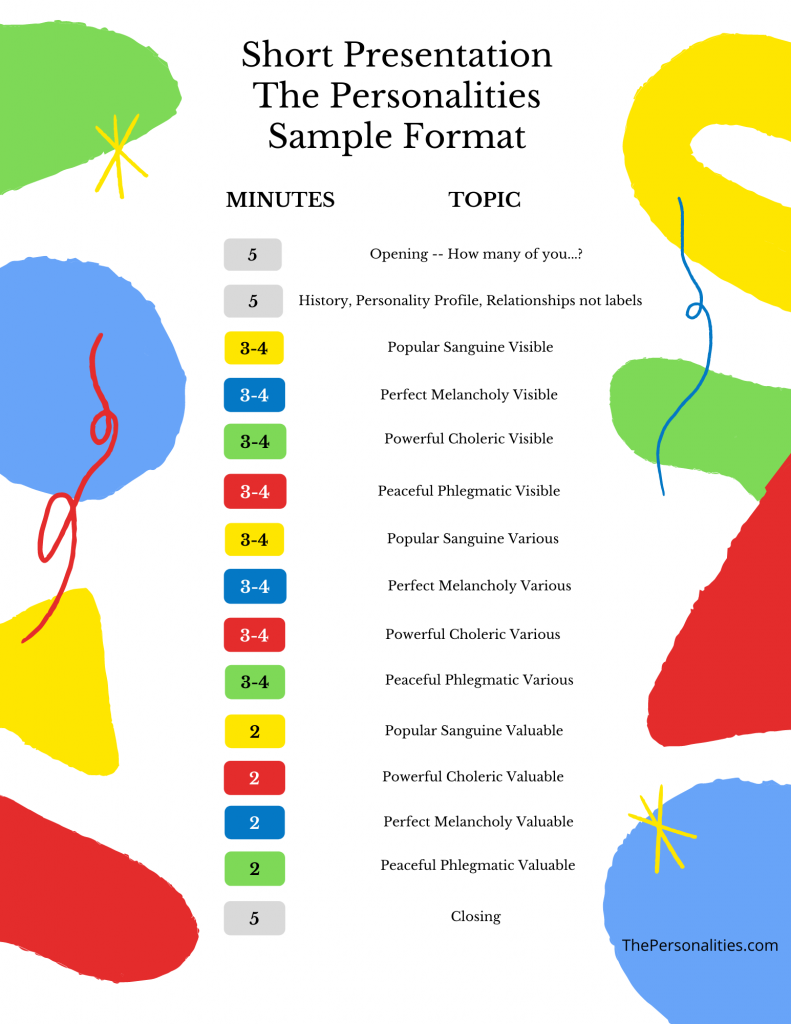How to teach The Personalities in a short time frame—Various Clues

By now, as you teach The Personalities, most of your audience should have identified the personality type of most of the people in their lives—and, usually, even themselves. Though, in this short time frame, I encourage you to keep the focus on understanding/getting-along-with others.
Mottos
If time allows, encourage those who are taking notes to write down these mottos for each Personality as they are a quick way to enhance the overall understanding:
Popular Sanguine: “Are we having fun yet?”
Powerful Choleric: “Just do it!”
Perfect Melancholy: “If it is worth doing, it is worth doing right.” (I let the audience fill in the last word.)
Peaceful Phlegmatic: “It doesn’t matter, whatever is easiest.”
Strengths and Weaknesses
As with the “Visible Clues,” you have about three minutes to cover each Personality. To do this, pick two strengths and one weakness from the strengths and weaknesses chart found on the complete Personality Profile. Generally, pick the ones for which you personally have the best stories—though, in a three-minute segment, you may only get to tell one full story. The other stories may be as brief as a sentence or even a statement.
Introduce the topic by saying: Due to our limited time today, we are just going to cover a few strengths and weaknesses for each Personality. Here, I like to laugh a bit and indicate that the strengths and weaknesses I am addressing are those where I have the best stories. This lets the audience know that the traits you’ll be covering are not necessarily the key or most important. Since you will be doing a very light treatment on the topic, you will want to wave the Personality Profile to show the chart to the audience and let them know that a complete listing is available as a part of the Profile—both on paper and online. I do not post the full chart as I hope the audience will want to take the Personality Profile or buy the book for more information.
Speech Notes

For my personal speech notes, I use the whole 16-page Personality Profile and I flip through it as needed. This keeps the product in front of your audience. On the actual Strengths and Weakness chart, I have the name, or a phrase/punch line, I use to identify each story written down next to the trait. To give you some ideas, I’m going to highlight some of the stories that I use. As you give your presentation on The Personalities, again and again, you will refine which stories work the best for you. If, before you start, you hear a story from someone in the group that you can incorporate, do it. It keeps things fresh and everyone loves to hear a tale about someone in the group.
Popular Sanguine
Again, I start with the Popular Sanguine. The Strengths I use, though not necessarily all in one three-minute segment, are:
- Curious—The story I tell is about a male friend who colors his hair. My Perfect Melancholy ex-husband asked me: “How do you know?” I told him: “Other than the fact that it drips down his face when he sweats, I saw the Just-for-Men box under the sink in his bathroom.” He was, of course mortified, that I was looking through his friend’s bathroom cabinets.
- Always a child—One day I was driving past a neighbor’s house. They have a trampoline in the back yard. There was Scott with his great-dane-mix dog jumping on the trampoline. Every time he went up, the dog came down. The dog came down, Scott went up.
- Thinks up new activities—I tell about being the party planner for my group of girlfriends and give a few examples of the fun events we’ve had.
Weaknesses:
- Compulsive talker—Popular Sanguines feel compelled to fill the dead air.
- Has restless energy—I do not “do nothing” well. This doesn’t mean that there is nothing I don’t do well, but rather that I have a hard time doing nothing.
- Hates to be alone—When I was filling out my husband’s friend Bobby’s Match.com profile, he told me: “I am not good alone.” To avoid being alone, he’s made some poor choices.
Perfect Melancholy
I like to go to the Perfect Melancholy next as the opposites provide a good comparison.
Strengths:
- Talented and creative—I use this one to point out the difference between the Popular Sanguine and the Perfect Melancholy. While the Popular Sanguine may dabble in various arts and crafts, the Perfect Melancholy masters his or her craft.
- Likes charts, graphs and lists—My husband does the accounting for my remodeling business. He’s made me a spreadsheet to help me enter the data correctly and in the order he wants it.
- Makes friends cautiously—My friend Kathy is new in town. While a mutual acquaintance introduced us, Kathy was hesitant to join in with our activities. Several of us discussed it and made a concentrated effort to reach out to her. She is now one of our closest friends—though if we do too much, she takes a break from us.
Weaknesses:
- Tends towards hypochondria—This includes those who go to the doctor for everything as well as the person who reviews their various aliments with you. Though the issues may be real, they aren’t good social conversation.
- Not people oriented—My husband, the CPA, said to me: “You know how many people I saw today? Zero. That’s how I like it. People mean problems.”
- Suspicious of people—I was in trouble with my ex-husband for telling the neighborhood children that we were going out of town. Defending myself, I told him they were children. He responded: “But we do not know their parents.”
Powerful Choleric
Strengths:
- Exudes Confidence—Here, I share a Peanuts comic featuring Lucy and Linus. She says: “I’m thinking of starting a discussion group.” Linus responds: “That could be very interesting.” Lucy: “People would come from all over to listen to me.”
- Thrives on Opposition—Because I love politics, I point out how much President Trump loved the fight, frequently claiming: “I am a counter-puncher.”
- Is usually right—When my ex-husband and I were in marriage counseling, he asked the therapist: “do you have any idea what it is like living with someone who is always right?”
Weaknesses:
- Is unsympathetic—I like to show two different get-well cards that perfectly represent the Powerful Choleric. The first is Mary Engelbreit. It shows a gal with her hands on her hips and a scowl on her face. On the front it says: “Snap out of it.” Inside: “and get well soon!” The second is from Hallmark’s Shoebox collection and features Maxine (a curmudgeonly old woman). Front: “Heard you’re sick.” Inside: “Wimp.” Ask the audience: How do Powerful Cholerics view sickness? They should shout back: “as a weakness.” As a result, they will seldom admit to being sick. In fact, the Powerful Choleric is the only Personality who will fake being well.
- May be rude or tactless—The powerful Choleric doesn’t see this as a weakness. Though their comments can be hurtful to others, they justify: “You always know where you stand with me.” Or: “I just tell it like it is.”
- Can’t say “I’m sorry”—Because they are usually right, the Powerful Choleric has a hard time apologizing. However, on those times when they realize they are wrong, rather than saying I’m sorry, he or she will change their tone or become solicitous. When living or working with a Powerful Choleric, accept this as a full-on apology.
Peaceful Phlegmatic
Strengths:
- Easy going and relaxed—When my husband and I were dating, he told me: “I’m easy baby.” He is. I am seldom in trouble.
- Good under pressure—In his practice, my husband gets the clients with the difficult and complicated tax returns.
- Dry sense of humor—Some friends and I were discussing going to the big antique market in Texas. She and her husband had been. They were tired around 3:00 in the afternoon and went back to the hotel for a rest. Fully clothed, she collapsed on the bed. He stripped down to his skivvies and laid down. The hotel staff came around, knocked on the door and opened it without waiting for a response. This happened a second day in a row—to which he responded: “If they keep doing that, I am going to have to get in better shape.”
Weaknesses:
- Quiet will of iron—The Peaceful Phlegmatic’s quiet will of iron often confuses people—thinking he or she is a Powerful Choleric. While it is generally true that the Peaceful Phlegmatic is adaptable and doesn’t make decisions easily, when they do make one, it is something that is very important to them, and no amount of discussion is going to change their mind.
- Lacks self-motivation—My husband has observed: “I probably could have been more successful in life, but I just didn’t have the motivation.” Here, I like to share a comic that shows a businessman with his feet on his desk: “I’ve learned to accept myself. I’m not a mover or a shaker. I’m a relaxer.”
- Sarcastic and teasing—Though they think they are funny, the biting comments can be very hurtful to others.
Note, some of these points take a bit longer to convey and others can be very brief.
In closing out this module, say: So far, you’ve been able to identify the Personality of the people with whom you live and work. Maybe you’ve even figured out your own Personality. I’ve told you some funny stories and you’ve laughed. We’ve had a good time. If I was to stop here, however, you’d just have a label. But remember I said in the beginning, this is not about labels. This is about relationships. You want to take this information home and use it, apply it. Next, and most importantly, we are going to look at the Valuable Clues, the emotional needs of each Personality. When you adjust your approach to others you can truly see changes in relationships.

[…] Personalities, this section can be covered quickly. If time is tight, be sure to cut some stories—Various Clues, rather than this module. Understanding and applying the information in this section has the real […]